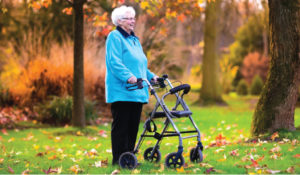 Unsteady walking is one of the leading reasons seniors fall and hurt themselves. If you’ve noticed that you aren’t as balanced or able to get around like you used to, a walking aid is essential for your safety.
Unsteady walking is one of the leading reasons seniors fall and hurt themselves. If you’ve noticed that you aren’t as balanced or able to get around like you used to, a walking aid is essential for your safety.
If you need minimal help when getting out of a chair or for walking around the grocery store a cane may be the first step, but when individuals need more support and more stability, canes will no longer suffice.
Walkers provide the highest level of stability and support. The issue is trying to decide which walker model is best for you. There are several types, and they all vary as to which is appropriate for specific needs.
Standard Walkers
Standard walkers are the traditional folding silver aluminum walkers that have been around for years. Some have no wheels and go clop-clop-clop as the user lifts and moves them with each step. These days, however, most standard walkers come with two wheels on the front legs which allow for more natural flow and movement. These walkers provide a great deal of support and stability and remain an excellent choice for those who use their walkers outside and inside and need maximum support and stability.
Three-Wheel Walkers
A three-wheel walker has a triangular shape and comes in a variety of colors. They are lightweight and very maneuverable. They are more “modern-looking” than the traditional standard walker. They also come with brakes and a storage pouch. Three-wheel walkers roll faster and are not as stable as the standard walker. Nevertheless, thousands of people use these walkers safely and they remain a popular choice.
Four-Wheel Walker With a Seat
A four-wheel walker with a seat, also referred to as a “rollator,” has the advantage of an available seat that is always with you. If you are in a mall or public park, and there is no place to rest, then you can lock the brakes on this walker and have a seat. They come in many colors and are now offered in upgraded styles, featuring larger storage pouches, bigger wheels and softer seats. The primary disadvantage of these walkers is that they are heavier, making it somewhat more difficult to put them in or out of a car.
Choosing the Correct Walker
Given the variety of choices, how do you decide which walker is right for you? Each model has its advantages and disadvantages. First, start by consulting your medical professional. If you are having trouble walking, a consultation with a physical or occupational therapist, with a referral from your physician, is a good place to start. Beyond that, choose a medical equipment supplier with a showroom containing many products to try, and professional sales assistance who can guide you in your choice.
Medicare Considerations
If you are covered by Medicare, remember that Medicare will generally pay for only one walker every 5 years, so it pays to choose carefully. Generally, Medicare pays the full price for the standard walker. If a three – or four-wheel walker is chosen, then it is usually up to the beneficiary to cover the additional cost of these upgraded models.
Kin-Care
At Kin-Care, we have a wide selection of walkers and many other products on display in our showroom. Our experienced sales professionals will be happy to spend time with you and guide you in your decision making, as you choose the walker that is right for you.
We are #1 in Customer Service! Kin-Care is South Florida’s leading source for medical supplies, home medical equipment, and mobility products. We promise knowledgeable advice, uncompromising quality, and dedication to assisting those who have special needs, to make sure you get the product that’s right for you. We file the necessary paperwork to assist you in obtaining the maximum allowable Medicare and insurance benefits for the
medical supply products you need. Please stop by, call (561) 477-2507 or visit kincare.net today.
Check Also
Trusted Homecare Agency: Serving Veterans with Free Supplemental Home Healthcare
When it comes to healthcare, veterans deserve the best care possible. For veterans seeking in-home …
 South Florida Health and Wellness Magazine Health and Wellness Articles
South Florida Health and Wellness Magazine Health and Wellness Articles




